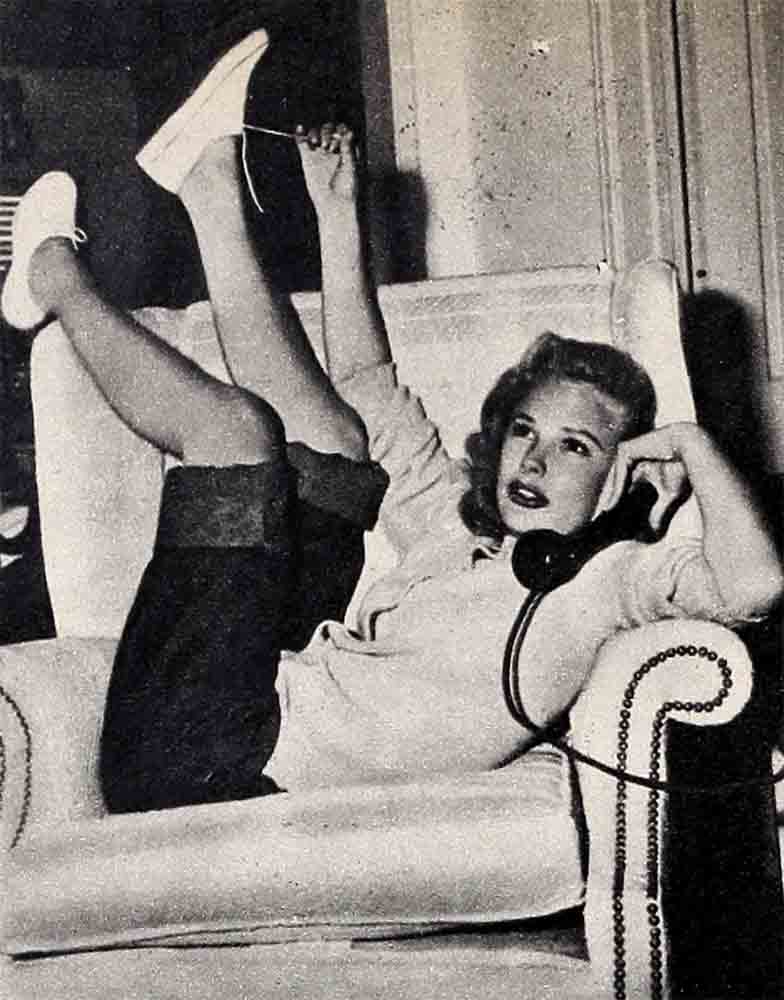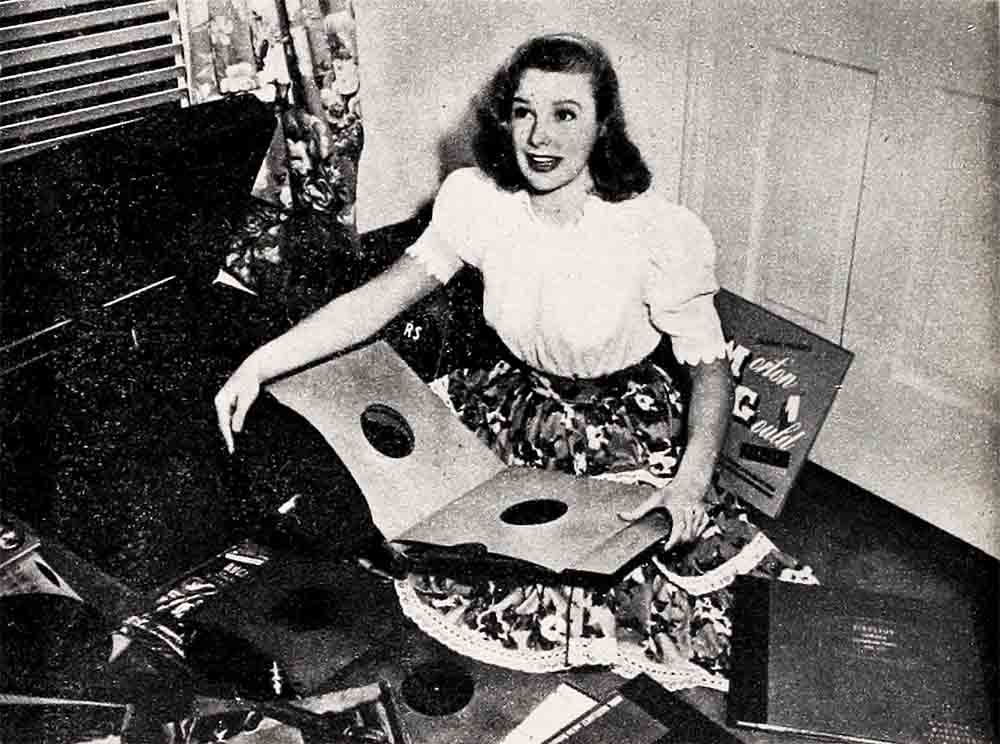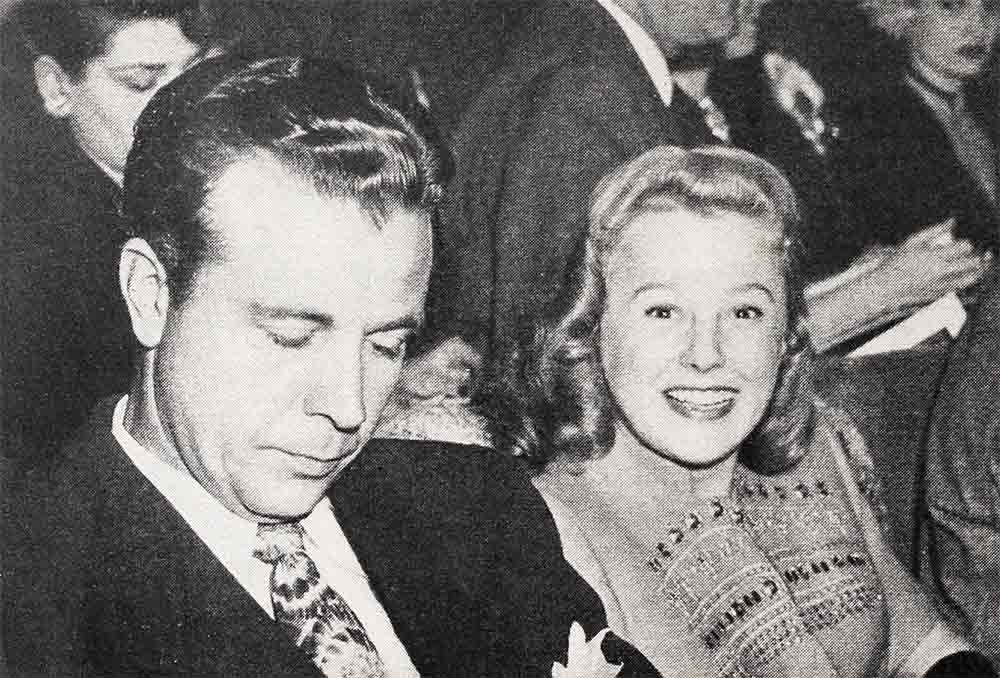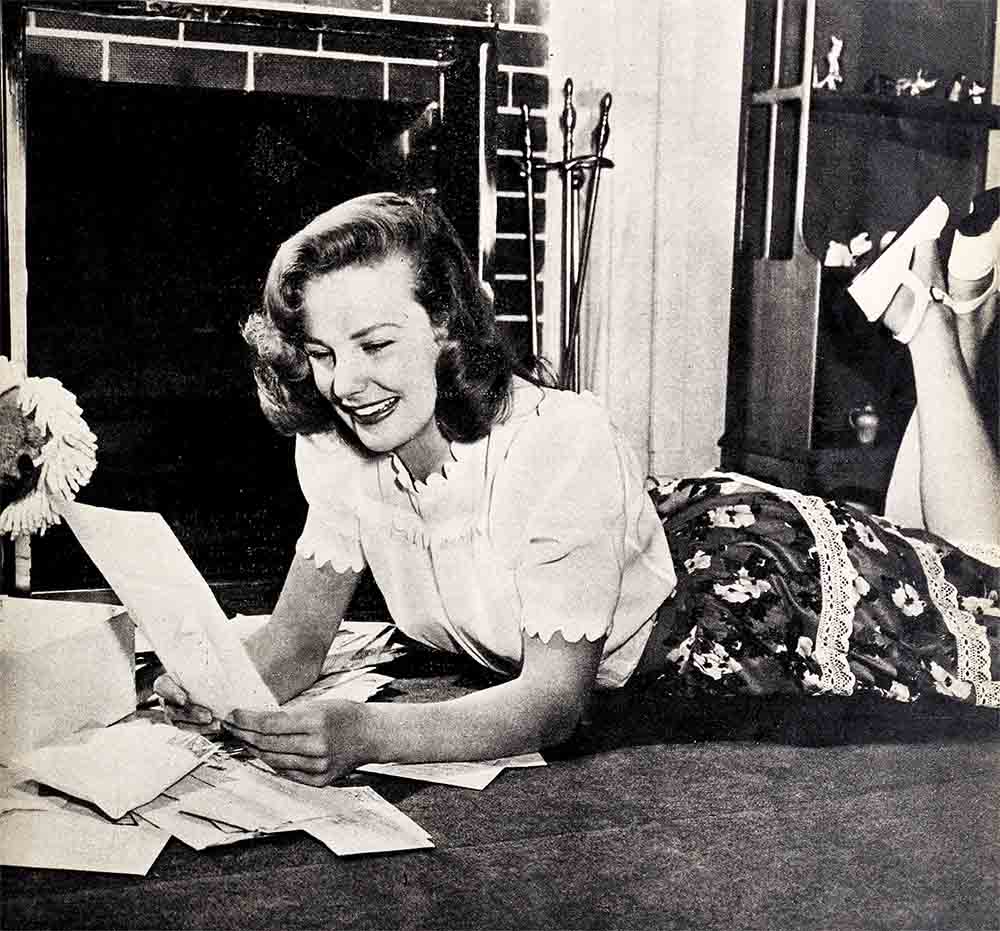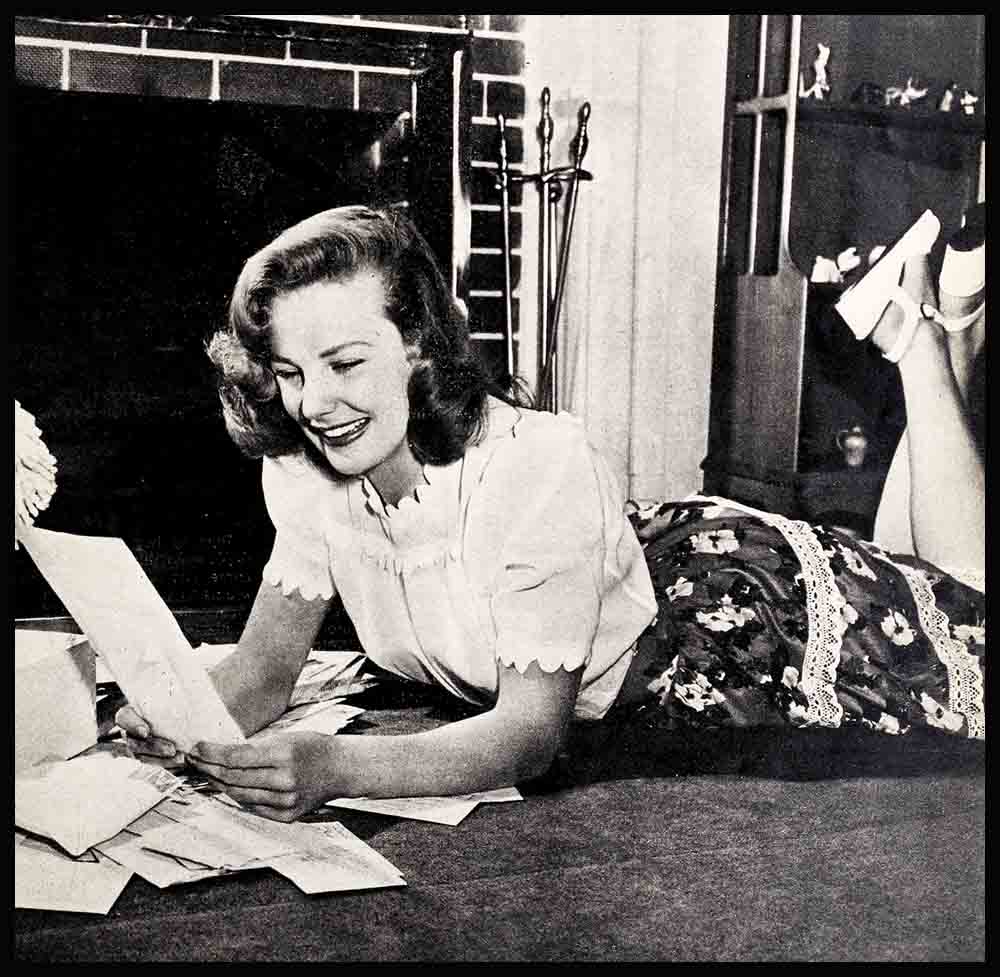
Girl Of The Moment
The idea of dancing came to June Allyson during the years when she sat in a wheel chair and didn’t know whether she was ever going to walk again. It took hold of her strongly; it had a meaning far beyond just the dancing itself.
Of course she was only a child then—nine, ten, eleven. Those are hard years not to be able to move and run and play with the other kids as June had played before the accident. She was a tomboy, and she rode a bike. There had been a storm, and the air was fresh. June, riding gaily along on her bike didn’t realize that a low-hanging limb ahead was going to crash down just as she got there. But it did. And there was no more play for her. So June used to run and play and dance in her imagination. She used to see herself running and dancing, even when the doctors weren’t very hopeful about her. Her grandmother, who raised her, understood and kept courage too.
AUDIO BOOK
All the time, inside her head, she was making a pattern of herself—moving.
“And I guess I thought I might as well go the whole hog,” June told me. “So long as I was imagining I might as well do a good job. When you can’t move yourself, movement takes on new proportions, you see. It isn’t something you just take for granted. You come to know its value, you think about palm trees swaying in the wind and waterfalls dancing over the rocks and—you picture yourself as ‘leaping as the hart’ the way it says in the Bible. When I learned to walk again and knew I was going to be well and like other girls—I was so happy I just literally danced for joy.”
They will tell you at the studio that whenever June Allyson does a dance in a picture, as she did in “Two Girls And A Sailor,” she still seems to dance for joy.
Part of her philosophy, which I don’t even think she knows she has,, came out of that, too. She never seems to take anything for granted. Every day is a day made new for Junie. I mean she’s actively pleased by things that most of us just expect to be there. You see, once upon a time she didn’t expect any of them; once upon a time she had, with the enormous faith and courage of the child heart, reconciled herself to doing without all those things and so they seem like special gifts from heaven when she gets them. It makes her very nice to have around, makes you a little humble yourself, makes you notice safety and courtesy and kindliness and friendship from others.
I don’t know whether Fred Astaire knows that he was the strongest influence in June Allyson’s life for a long time, the inspiration for her change of plans, practically the motivating force that sent her into the theater in search of a job, so that she could save enough money to study medicine.
When she was well enough to be back in high school, up in Lucerne, Westchester County, New York, where she was born and raised, somebody took her to see Fred Astaire in “The Gay Divorcee.”
That did it. Somebody could dance like that. Somebody could move and leap and make music and movement one, somebody exhibited all the grace that she had thought existed only in her lonely, hungry little imagination. It wasn’t just a dream. It was real—Fred Astaire’s dancing feet made it come true.
Of course she couldn’t afford to go to see him every night the way she wanted to. Much too expensive. Even when she saved her pennies and sat in the gallery she couldn’t go as often as she wanted to. But again in the quiet lonely years, her mind had learned to grasp impressions, to hold onto them and to live them not just the one time they happened but over and over.
“When my school friends came to see me,” June said, “it was such a wonderful occasion and I enjoyed it so much. Then when they had to go away and I was alone—why, I’d live it all over again and again. I guess children always do that but I did it more than most.”
So she was able to make a sort of memory film of Astaire’s dancing, and she got the phonograph records and from that memory film started in to learn to dance all by herself. Her short life had taught her that what you want you have to work for, her short life with its tragic years after the accident had toughened her up, in a way. Even being on her feet, she’d done the hard way.
And so she combined the two—her desire to repay her gift to others, the gift the miracle of medicine and surgery had performed for her, by being a doctor—and her dancing was a means to that end.
“I’m going to apply for a job in a New York show, in the chorus,” she told her chums in high school and when they laughed at her, her stubborn little jaw came out and she glared at them.
Down she went and applied for a job in the chorus of a musical show which didn’t last very long, as it happened, though June swears it wasn’t her fault.
Standing in the wings with about a hundred other girls, she tried to conceal her nervousness, tried to pretend she wasn’t a sophomore in high school. When the director called her, she went out onto the stage, trying to pretend she knew all about it.
“Do you sing?” the director said.
“Oh yes,” said June Allyson.
“Well, tell your piano player to go ahead then,” he said.
That was the first time June had ever heard of a piano player. She didn’t know that girls applying for jobs in the chorus always brought some music of their own, some songs they’d learned and somebody to play their accompaniments.
“I like singing without music,” said little Miss Allyson, “you can hear me better.”
Halfway through the director stopped her. He said, “Do you dance?”
“Yes,” said Junie.
“Do that without music, too?” the director said.
“Of course,” said June.
“Well, get on with it,” the director said.
Nor had she known that girls work out special routines, not just the ordinary steps, but full of, if possible, unusual routines. So she began to dance. This time he didn’t stop her. Most of the other girls he had stopped after a few steps, but June danced on and on and on until finally she thought she was going to fail on her face.
“Got a finish for that?” the director said, and June got her breath enough to say, “Yes, sir.” “Well, get on with it,” he said, and she did.
By that time he knew that she’d never been in a show and that she didn’t have the faintest idea what she was doing. But he must have seen something in her because she was one of eight girls picked for the show.
“It’s a good thing it didn’t run very long,” June says with a chuckle, “because I had to go back to high school.”
Next time she went after a job it was “Very Warm For May.” And there her comedy talents were unexpectedly discovered. She isn’t very tall now—about as big as a pint of milk—but then she was two inches shorter, and she was “on the end” of the chorus line. The costume in the first number had a big hat on top of it and June was so little and the hat was so big that she got mixed up with it—and the audience laughed. So they kept that bit in the show and gave her the other comedy bits and—from there she went on to “Panama Hattie.”
“You’d never think measles would give you your break in life, would you?” June says wistfully. “Not mine. Betty Hutton’s. If Betty Hutton hadn’t had measles—of course they’re not very serious—I didn’t want her really to be sick, not bad, but when you’re an understudy—well, you know how it is.”
That was in “Panama Hattie.”
Being in the chorus, June Allyson had decided, wouldn’t ever get you where you wanted to go. Wouldn’t ever earn money enough to put away in the bank. You had to get a chance to show what you could do. From the night the show opened, even during rehearsals, June had watched Betty Hutton.
“I thought it was so wonderful to make people laugh like that,” she said to me. “I thought it was the greatest thing I’d ever seen. I used to watch her every night all the time from the wings, and I’d see people out there looking tired and depressed, you know how faces look sometimes, and then Betty would come on and they’d perk up and pretty soon they’d be laughing and happy and forgetting their troubles. So one day I got up my courage and went to Mr. De Sylva—he wrote and produced the show and somehow you weren’t ever afraid of him—and asked him if I could understudy Betty Hutton.
He didn’t think much of the idea. They had another understudy, but he said if I wanted to learn the numbers to go away and do it and when I thought I could do them to come to him and he’d give me an audition.
“So,” said June Allyson with a grin, “I went over in the corner for five minutes and then came back and he said something like what-the-hell, do you think you know them already and I said yes Mr. De Sylva, and so he laughed and said go ahead and then he let me understudy Betty Hutton.”
Things broke for June Allyson then. Because Betty Hutton got the measles “nothing very bad,” as June put it, and June went on in her place and out in front that very night were Arthur Freed, one of Metro-Goldwyn-Mayer’s top producers, and the Broadway playwright and producer George Abbott.
Both of them saw June Allyson. They saw she had something, they saw she was little and cute and she could dance and sing, but they also saw right then that she was a lot of rare combinations—she was pretty and funny, which doesn’t usually go together. And she was funny and somehow kind of heartbreaking all at once.
When the curtain went down, both of them were at the stage door asking for June Allyson—and they all got together and agreed June should do Mr. Abbott’s “Best Foot Forward” on Broadway first, and then go to Metro-Goldwyn-Mayer for pictures.
They agreed.
But it was, though they didn’t know it, quite a while before June Allyson agreed.
Because though they didn’t know it—nobody knew it except June—she wasn’t dancing and singing and being funny in order to have a stage career or become a movie star. She wasn’t learning all the time and working long extra hours practicing Betty Hutton’s numbers a thousan times or more, wasn’t planning and using her wits to get the breaks some that son day her name would be up in electro lights.
Not for one moment had she wavered in her determination, not once had she lost sight of her goal. If she got break, she got more money. If she was featured, if she had a little song of he own, a dance number of her own, it mean more pennies in her pay envelope an that meant more dollars eventually in he bank account and that meant that pretty soon she’d have enough to give up that stage and go to medical school.
That ambition was still with her when she came to Hollywood and, as far as know, June Allyson is one of the very few girls who ever hit this motion picture world with no definite determination to be a movie star. Few others ever intended to use Hollywood as a stepping stone to another profession.
I don’t know, because I don’t think she does, when June Allyson changed he mind. But somewhere in the two years since she has been on a studio lot the change took place.
I would hesitate a long time to tell you this part of the story if I weren’t sure in was true, if all the evidence didn’t bean me out, because it is so unlike any other Hollywood story of success I’ve ever encountered.
Her success on the lot was remarkable. They gave her small parts—ordinary little routines to do. And then producers or directors saw the rushes—and rewrote the stories—and little by little June had more to do than anybody intended. For instance, she wasn’t supposed to co-star with Van Johnson and Gloria De Haven in “Two Girls And A Sailor.” She wasn’t supposed to have half as much to do in “Music For Millions”—her first straight dramatic part—as the final picture showed.
Her simplicity, her directness, and that inner thing she has to offer just came out. Perhaps because she was so relaxed, perhaps because she wasn’t burning with ambition. Little by little, everybody was talking about June Allyson. You heard her name all over the lot. Important people would say, “There’s a girl who really has something.” Plans for her future were made, stories bought for her, and—suddenly June Allyson woke up to the fact.
The glamour didn’t go to her head, Hollywood didn’t fascinate her. Today she lives in the same attractive little apartment out in Westwood that she took when she first came here. If you see her shopping in Beverly Hills she will be driving a little convertible and wearing a peasant skirt and a frilly white blouse and a blue kerchief tied over her blonde hair. The same housekeeper takes care of her and her little home and the time she buys clothes is when she’s done a radio show and has an extra check.
“I—I guess I haven’t quite gotten over saving to go through medical school,” June says. “I made it a habit so many, many years—I didn’t let myself do things because I wanted to get on with the main business of going to school—and so I just go on living the same way.”
Nobody knows what it cost June to give up the ambition that had been the guiding star of her life, the very mainspring of her existence, almost her religion.
But somewhere it came to her that she couldn’t have been so successful in her work as an actress and an entertainer just for money. That sort of flabbergasted her, even though at first she tried to explain it by the fact that the money had been to achieve her dream. That didn’t answer it either.
Then one night she was thinking about it, and she remembered the way people’s faces lighted up when they watched Betty Hutton. For a week she went around to movie theaters all by herself. She didn’t look at the pictures, she watched how the audiences were lifted out of themselves and saw how they were influenced.
June doesn’t put it into words, except in a vague way here and there. But the truth is that she came to think that people’s minds and hearts and maybe even their souls needed doctors as much as their bodies. She faced the fact that apparently she had a gift for the profession of acting and entertaining and—“Maybe I wouldn’t have been a good doctor at all,” she says wistfully. “Anyway, I don’t think I would have been so lucky in this business if I’d been meant to be something else.”
Maybe if she hadn’t had that ideal of service, maybe if she hadn’t had that working philosophy of gratitude for life, that joy at being able to dance, that wonderful inside happiness that makes her love to sing—she wouldn’t have been so “lucky” in the motion-picture business.
And I’m quite sure if she hadn’t had that tragic struggle as a kid she wouldn’t have had the look in her eyes that made me pick her as a great star of the future.
There’s something characteristic about June’s first love affair.
She was ten and in the hospital then, and there was a little boy who was ten and whose name was Tommy. On sunny days they used to to be wheeled up on the roof and so they began to talk to each other and at last they fell in love.
Tommy had a big piggy bank and whenever his relatives came, they’d drop in pennies, dimes or even “folding money.”
Being in love, Tommy wanted to do something for the little blonde girl whom they had told him would never walk again. So he let her hold the piggy and take it down to her room at night.
But—Tommy got well first and went home and—June hid the piggy bank.
“It’s haunted me ever since,” June Allyson said. “There was $16.75 in it. Wasn’t it an awful thing to do? I loved Tommy and I wanted to keep the piggy bank because he gave it to me. But then afterwards—there I was with all his money and I didn’t know his last name and I don’t now—but I wish I could find him because I’ve still got the piggy bank. I wouldn’t give him that—it’s my treasure—but I would like to pay back the $16.75.”
So if Tommy reads this story maybe he will recognize the little girl in the wheel chair as the star of motion pictures—and if so he can come and collect his $16.75, but not his piggy bank.
Nowadays she goes out occasionally with Van Johnson and they have fun together at parties for, as her partner in “Two Girls And A Sailor,” he is part of her success story. She was once thought to have a budding interest in John Hodiak because, as she said, “he is so unactorish.”
It may be this very “unactorish” quality which first attracted her to Dick Powell. They, too, were in a picture together, “Meet The People.” But it wasn’t the picture that did the trick; it was their mutual enthusiasm for boats and swimming and a love of simple things. I do not believe theirs is a burning romance, if indeed it is a romance at all. But it is a wonderfully heartening friendship to both; the man who has suffered a deep shock in his own life, the girl who has known great discouragement in hers.
Surely the discouragement is over for her now as she dances on the doorstep of good fortune. For she has earned that fortune richly.
THE END
It is a quote. PHOTOPLAY MAGAZINE JANUARY 1945
AUDIO BOOK

